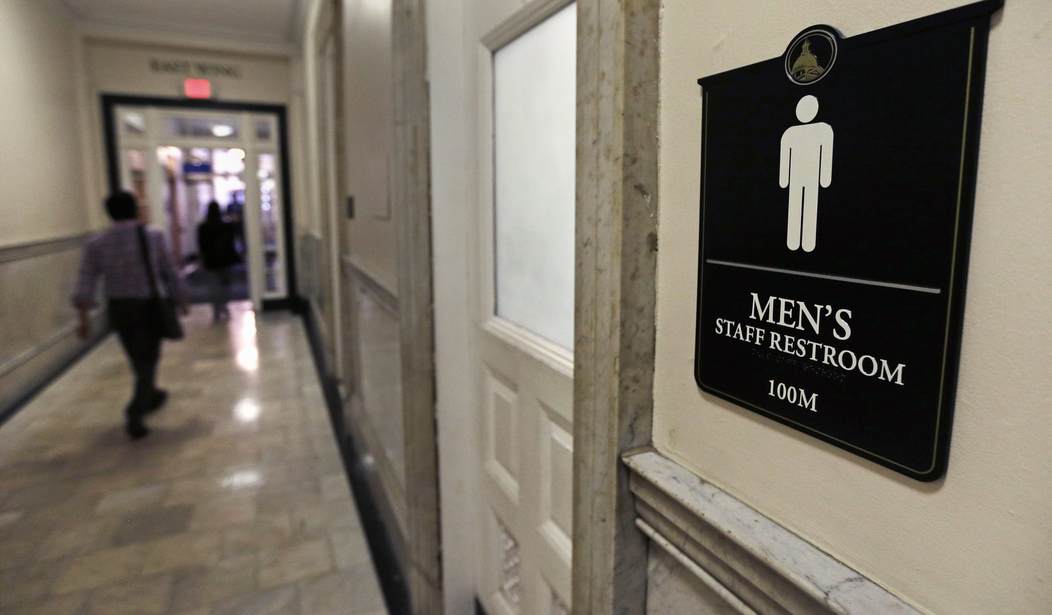Zack Ford, the LGBTQ editor at the liberal website ThinkProgress.org, warned his progressive readers that “anti-transgender bigots” in Massachusetts had sunk to a new low with new TV ads reminding voters of the impact of laws allowing people who choose their gender identity to also decide which public restroom to use.
Massachusetts voters have a chance in November to undo what Gov. Charlie Baker (R) and the legislature did in 2016. Question 3 asks voters if a law that banned discrimination against transgender people should be overturned. That law allows people to choose the restroom they would like to use, a decision that opponents say opens a door to sexual assault or at the very least an invasion of privacy.
Ten days after the legislation was signed by Gov. Baker, a group called Keep MA Safe began a petition drive, Repeal the Bathroom Law, to place Question 3 on the November ballot. But, paradoxically, a “yes” vote on Question 3 would keep the current law in place. A “no” vote would repeal the public accommodation law.
“The bill relegates a person’s sex to their state-of-mind or a mental choice, instead of basing it in biological reality. Those advocating for this bill do not believe that men are necessarily men and women are necessarily women. Rather, they believe that biology is an inconvenient fact when it comes to matters of identifying one’s sex,” reads the Keep Massachusetts Safe website.
“This bill would endanger the privacy and safety of women and children in public bathrooms, locker rooms, dressing rooms, and other intimate places (such as common showers), opening them to whomever wants to be there at any given time, and also to sexual predators who claim ‘confusion’ about their gender as a cover for their evil intentions,” the Keep MA Safe website concludes.
Amira Hasenbush, first author on a peer-reviewed paper and a fellow at UCLA Law’s Williams Institute, told the Daily Hampshire Gazette that while the study did not include the effect of the law passed in 2016, it showed that areas of Massachusetts that have lifted public restroom restrictions have not seen an increase in sex crimes.
Hasenbush said the paper showed fears of sexual attacks as the result of laws prohibiting discrimination against transgender people are “not grounded in fact.”
“We’ve done the research,” Hasenbush said. “That fear doesn’t hold.”
But the TV ads that have enraged Ford and others on his side of the debate dovetail off the fear expressed by Keep MA Safe.
In one ad, a man peers out from behind the door of a bathroom stall as a woman begins unbuttoning her blouse. The announcer warns, “Question 3 means any man who says he is a woman can enter a woman’s locker room, dressing room or bathroom at any time, even convicted sex offenders.”
The ad “regurgitates all of the same demonizing ‘bathroom safety’ gropes from past fights against trans equality,” Ford wrote.
Another “Vote No on 3” ad features a woman telling the story of how a boy entered the girls’ locker room at her daughter’s school to change his clothes with the girls. “Our children deserve the right to privacy,” she says as the text on screen warns that if any of the girls had tried to stop the boy from undressing with them, they could have been charged with a crime.
“We’re just trying to get the message out about how far-reaching and how broad this law is because there is a lot of misinformation and a lot of non-information about what this law really entails,” Yvette Ollada, a spokeswoman for Keep MA Safe, said to One News Now.
Nicole, a transgender teenage girl, is among those who speak for those who support lifting bathroom gender restrictions in a video produced by Freedom for All Massachusetts. “If they take away this law, I can be discriminated against,” Nicole explains in the video, and her mother says a “no” vote on Question 3 would be “paralyzing.”
Campaign reports filed in September showed Freedom for All Massachusetts was vastly outspending Keep MA Safe, investing $1 million after raising $1.8 million. Keep Massachusetts Safe had been able to pull in only $106,300 in donations, and spent just $80,000.
A WBUR poll released in late September showed overwhelming support for Question 3, which would continue Massachusetts’ law regarding transgender discrimination.
But a Mass Lowell-Boston Blog poll released the first week of October showed that while 74 percent of likely voters were against repealing the legislature-approved transgender protections, only 56 percent believed transgender people should be allowed to choose which restroom they use.
Researcher Joshua Dyck said the poll indicated voters were “confused” about gender identity and public bathrooms.
Conservative voices like Billy Davis, associate editor of One News Now, and One News Now reporter/anchor Chris Woodward believe Massachusetts voters know exactly how they feel about transgender people choosing public restrooms and lockers rooms.
“The liberal bastion of Massachusetts is sweating over a ballot initiative that could overturn a 2016 law that opened women’s public restrooms to men,” Woodward and Davis wrote. “Massachusetts is not a lost cause for conservatives.”









Join the conversation as a VIP Member